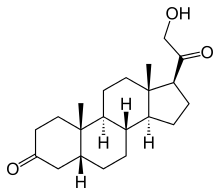Hydroxydione
 | |
| Clinical data | |
|---|---|
| ATC code |
|
| Identifiers | |
| |
| Synonyms | 21-Hydroxy-5β-pregnane-3,20-dione |
| CAS Number | |
| PubChem CID | |
| DrugBank | |
| ChemSpider | |
| Chemical and physical data | |
| Formula | C21H32O3 |
| Molar mass | 332.477 g/mol |
| 3D model (JSmol) | |
| |
| |
Hydroxydione, as hydroxydione sodium succinate (INN, USAN, BAN) (brand names Viadril, Predion, and Presuren),[1][2][3] is a neuroactive steroid which was formerly used as a general anesthetic, but was discontinued due to incidence of thrombophlebitis in patients.[4] It was introduced in 1957,[3] and was the first neuroactive steroid general anesthetic to be introduced for clinical use, an event which was shortly preceded by the observation in 1954 of the sedative properties of progesterone in mice.[5]
Chemistry
See also
References
- ↑ Index Nominum 2000: International Drug Directory. Taylor & Francis. January 2000. pp. 531–. ISBN 978-3-88763-075-1.
- ↑ Ashutosh Kar (1 January 2005). Medicinal Chemistry. New Age International. pp. 63–. ISBN 978-81-224-1565-0.
- 1 2 William Andrew Publishing (22 October 2013). Pharmaceutical Manufacturing Encyclopedia, 3rd Edition. Elsevier. pp. 1863–. ISBN 978-0-8155-1856-3.
- ↑ Edmond I Eger II; Lawrence Saidman; Rod Westhorpe (14 September 2013). The Wondrous Story of Anesthesia. Springer Science & Business Media. pp. 632–. ISBN 978-1-4614-8441-7.
- ↑ Ralph I. Dorfman (22 October 2013). Steroidal Activity in Experimental Animals and Man. Elsevier Science. pp. 447–. ISBN 978-1-4832-7299-3.
This article is issued from
Wikipedia.
The text is licensed under Creative Commons - Attribution - Sharealike.
Additional terms may apply for the media files.